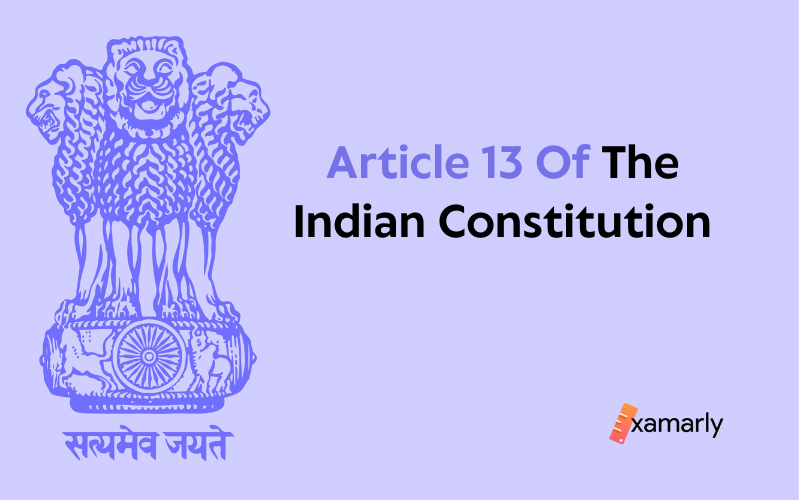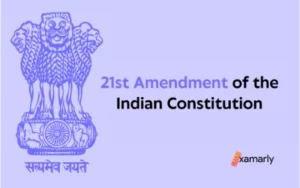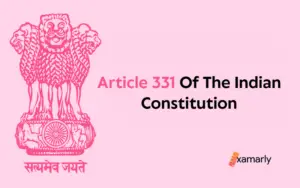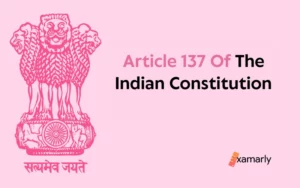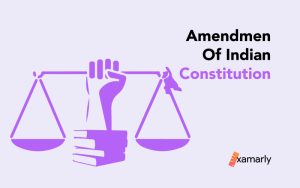The Drafting Committee included Fundamental Rights in Part III of the constitution. It was done to uphold people’s belief in the law. It grants Indian citizens their freedom and guards against the state encroaching on their rights.
The introduction of Articles 12 and 13 aimed to maintain public trust in the State. While Article 12 of the Indian Constitution explains what a state is and discusses the basic structure and obligations it has to its citizens and to protect their fundamental rights, Article 13 of the Indian Constitution, which is divided into four parts, strengthens and gives substance to the idea of fundamental rights.
What Is Article 13 Of The Indian Constitution?
The meaning of Article 13 of the Constitution is to reserve and preserve the fundamental rights of the citizen, protecting them from laws that may otherwise infringe upon our freedom. Article 13 of the Indian Constitution states that all the amendments and laws passed by the Parliament are tested. It must be based on their validity under the Indian Constitution. These rights are fundamental and legal rights of people.
4 Clauses Of Article 13
Following are the 4 clauses of Article 13 of the constitution of India:
- Any legislation that was in force on Indian land before the Constitution went into effect and that clashes with the rules of this Part shall be deemed invalid. If there is a dispute, it will be void.
- Any law passed by the State that violates this clause will be invalid to the extent that it violates this clause and takes away or reduces the rights granted by this Part.
- Laws in force include laws passed by the legislature or other relevant authority in the Indian subcontinent before the onset of this Constitution and not previously rescinded, despite the verity that any such law or any part thereof may not then be in function either at all or in part. Ordinances, orders, bye-laws, rules, regulations, notifications, customs, or usage having the force of law in the territory of India are included in the definition of law only if the context otherwise requires.
- No change to this Constitution adopted in accordance with Article 368, Right to Equality, shall be subject to the provisions of this article.
Applicability Of Article 13 To Constitutional Amendments
Whether Constitutional modifications fall inside the definition of “law” as defined in Article 13 has been one of the most divisive topics in connection to that clause.
- In the case of Shankari Prasad Singh Deo v. Union of India, the Supreme Court made the initial decision on this matter (1951). In this instance, it was argued that the 1st amendment of the Indian Constitution violated fundamental rights and was hence unconstitutional under Article 13 of the Constitution. The Apex Court, however, ruled that Article 13 review cannot be used to challenge constitutional amendments approved by the Parliament under Article 368 of the Constitution.
- However, in the case of I.C. Golak Nath v. State of Punjab (1967), the Court adopted a different perspective. The Supreme Court finally decided that constitutional amendments are under the purview of Article 13 and may be declared unlawful if it is found that they infringe upon the fundamental rights guaranteed by Part III of the Constitution. The Golak Nath decision was later overturned in the issue of Kesavananda Bharati v. State of Kerala, in which the SC upheld the legitimacy of the 24th Constitutional Amendment Act and governed that while any fundamental right may be amended by Parliament, the Constitution’s fundamental structure may not be changed.
Important Doctrines Evolved By The Courts
Doctrine Of Severability
- While it is stated in article 13(1) that pre-constitutional law only becomes invalid to the extent of its discrepancy, it is stated in article 13(2) that post-constitutional law shall be void to the extent of its violation.
- According to the idea of severability, if any section of law is incongruent, the remainder of the law will still be enforceable. Both pre-and post-constitutional laws are affected.
Doctrine Of Eclipse
According to the Doctrine of Eclipse, any pre-constitutional legislation that violates the fundamental liberties guaranteed by the Indian Constitution would become dormant rather than repealed. As long as the State does not change the law by removing its violation of fundamental rights, it will continue to be inactive.
The doctrine of eclipse applies to the Indian Constitution’s Article 13(1).
Doctrine Of Waiver
- The doctrine of waiver is founded on the idea that an individual is his own best judge and has the freedom to forego exercising rights that the state has granted him. However, the individual must be aware of his rights and understand that any waivers must be freely given.
- The doctrine of waiver says that when a person waives a right, that right is no longer available for assertion. The right to dispute the constitutionality of the statute for which the right is waived off is hindered.
- The philosophy is founded on the notion that an individual is the best judge of his or her own objectives and should make decisions based on all the available information. In India, a person may waive rights resulting from a contract or a law, but they cannot waive away constitutional rights or rights that the constitution itself guarantees.
Need For Fundamental Rights
- A nation grants its citizens certain rights that contribute to their development and allow them to live lives of the utmost dignity. There are several essential rights among these rights as the right to freedom of speech, equality of opportunity in public employment, etc.
- These rights are the most fundamental ones, without which it is impossible for a person to survive. The spirit of upholding an individual’s dignity and freedom from governmental intrusion is embodied by fundamental rights.
- A person may directly appeal to the Supreme Court in the event that their fundamental rights have been violated. It makes sure that everyone is subject to the law’s rules, including the government and the populace.
- These rights are subject to certain reasonable restrictions.
For Further Readings:
Conclusion
Prior to the ADM Jabalpur case, fundamental rights were not as important. Since then, there have been numerous advances, but many more are still to be achieved.
The legal system must be in place for Article 13 of the Indian Constitution to function. This means that the entire definition of law must be well-armed, regardless of whether prison initiatives are to be altered.
he legal system should be made more transparent, or rights are to be provided against private persons as well as the state. Article 13(1) runs the risk of becoming outdated if personal laws aren’t included in it because the majority of pre-Constitutional legislation has been tested under Part III.
However, a number of pre-Constitutional personal laws are still in force today without undergoing judicial review. Only a broad and open interpretation will be able to achieve Article 13’s genuine goal.
FAQs
What Is The Meaning Of ‘Laws In Force’ Under Article 13 (3) (b)?
Laws that were passed or made by a legislative body or another competent authority in Indian territory prior to the start of this Constitution and that have not yet been repealed also count as laws in force, even if they were not entirely or in some areas in effect at the time.
How Did Fundamental Rights Originate In Indian Constitution?
The “Constitution of India Bill,” introduced in 1895, was the first call for the establishment of fundamental rights. It was drafted in 1895, at a time when Indian nationalism was beginning to bloom and Indian aspirations for self-government were becoming more vociferous, and it is also sometimes referred to as the Swaraj Bill.
What Are The Characteristics Of Fundamental Rights?
Some characteristics of fundamental rights are
1. These are the basic rights of every individual that are given in the Constitution of India. 2. They are guaranteed to all citizens.
3. These are not absolute rights.
4. Applied without any discrimination on any grounds. 5. Enforceable by the courts subject to certain conditions.


